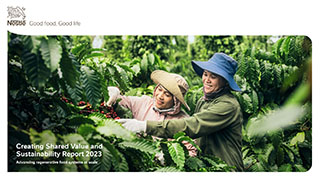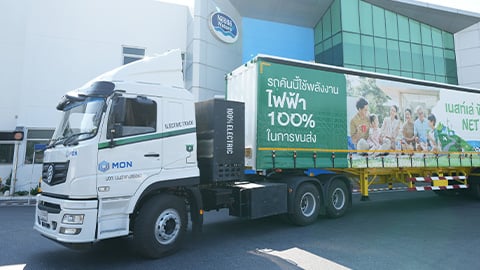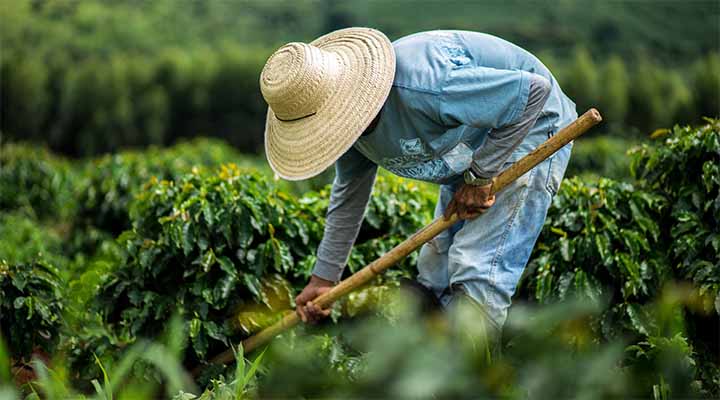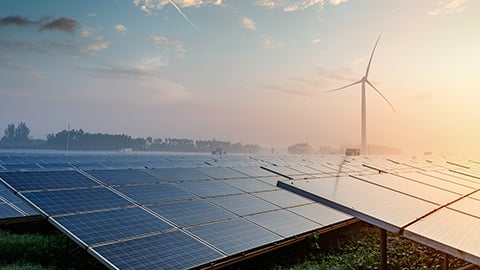Key actions to fight plastic pollution

Plastic waste that accumulates in landfills and the environment is one of the most pressing environmental issues of our time.
Plastic waste endangers wildlife and threatens ecosystems and the food chain. We see plastic pollution as an urgent priority.
We cannot solve this global problem alone, so we are collaborating with other companies, research institutes and governments around the world to identify ways to collectively reduce plastic waste in the environment.
Supporting a future where no Nestlé plastic packaging ends up in landfill or the ocean
Taking action to fight plastic pollution
Our aim is to use less virgin fossil-fuel-based plastic in our packaging. By eliminating unnecessary plastic (from tear-off bands to single-use items like straws), introducing reusable and refillable alternatives and switching to paper, bio-based and biodegradable materials, we are already reducing our plastic footprint.
As of the end of 2023, 83.5% of our plastic packaging was designed for recycling and we aim to reach more than 95% by 2025. We remain committed to achieving 100%. We are on track to reduce the use of virgin plastic by one-third by 2025.
Our actions extend beyond the materials we use in our packaging. To help prevent our packaging from ending up in landfills, we are working to make recycling easier and better, by supporting infrastructure improvements and encouraging people to do what they can to tackle plastic pollution.
Creating change like this beyond our own operations requires strong collaboration. We are part of the Consumer Goods Forum’s Plastic Waste Coalition for Action, the World Economic Forum’s Global Plastic Action Partnership (GPAP) and plastic pacts around the world. This highlights our aim to lead voluntary action by companies in this space.
In 2019, we joined the Ellen MacArthur Foundation’s New Plastics Economy initiative. We pledged to work across the industry to create a circular economy for plastic, starting with packaging. We are eliminating unnecessary plastic in our packaging and innovating to make the plastic that we do need recyclable and reusable.
We are continuing to support governments by actively advocating for harmonized and better regulation to accelerate infrastructure development in markets where we operate. We advocate for a legally binding UN Treaty on Plastic Pollution and are an active member of advocacy group, the Business Coalition for a Global Plastics Treaty.
We are committed to playing an active role in the development of well-functioning collection, sorting and recycling schemes across the countries where we operate. The global infrastructure gap is significant and not in our immediate control – but we are working to support successful collection with projects and activities around the world.
Collecting as much plastic as we sell
In many countries, Nestlé teams up with partners working to recover and recycle as much plastic as we use in our packaging, based on a 'one tonne in, one tonne out' principle.
We have identified a number of countries in Asia, Africa and South America where waste is often mismanaged. In these countries we have set up projects, working with partners and associations to scale up collection, sorting and recovery of plastic waste. The aim is to keep plastics in the economy and out of the environment.

Making coffee pod recycling easier
In Belgium, since January 1 2023, all beverage capsules, whether aluminium or plastic, can be collected in the new Blue Bag for recycling. This new recycling solution is the result of a partnership between Nespresso, Nestlé (for the Starbucks by Nespresso, Nescafé Farmers Origins and Nescafé Dolce Gusto brands), JDE Peet’s (for the L’Or and Douwe Egberts brands) and FostPlus, initiated by Nespresso via AREME (a Belgian initiative bringing together players from the entire aluminium value chain). This initiative is currently entirely financed by the brands mentioned above.
The initiative is a significant step forward to remove barriers to recycling for our consumers and to help increase collection and recycling rates. We encourage all producers of beverage capsules in the market to join the initiative.

Piloting the reusable packaging systems of the future today
We are partnering with Circolution, a German start-up to test the next generation of standardized reusable food packaging containers. The Circolution and Nestlé partnership enables German consumers in select cities to enjoy Nesquik in standardized, reusable stainlesssteel containers.
Circolution rents reusable containers to Nestlé, its first testing partner, and takes care of the cleaning, quality inspection, transport and assessment of environmental performance. Other food companies can also use the same container with their own unique labelling and products.
Consumers can receive a refund by returning the reusable packaging, either in reverse vending machines or to staff in store. Circolution estimates that after five cycles the environmental impact is comparable to single-use glass packaging. The stainless-steel packaging has an estimated 75 cycles, estimated to save the equivalent of 36kg of glass, or 5kg of plastic, over its lifetime.
Testing new solutions in refill to reduce Nestlé’s plastic packaging
Nestlé Indonesia and Nestlé’s R&D Accelerator in Singapore have explored several packaging refill systems in the past year. In 2022, we tested a system with Siklus Indonesia where consumers order food and beverages including Nestlé Milo, Dancow, and Koko Krunch on an app and receive their products through a refill system via a bicycle service. The scheme, which supports the Indonesian government’s ambition to reduce waste by 30% by 2025, is being examined as a potential model for reducing single-use plastic.
In 2023, we launched a pilot refill vending machine service at retail partners’ shops for Koko Krunch cereal and Milo. This is a partnership with Qyos, part of the venture-builder Enviu Indonesia and Algramo. Foods are packed into sealed dispensing cartridges at the factory, then dispensed directly into the consumer’s own container or a branded container at the retail location. By launching flexible cross-value chain tests with partners in machines, start-up management and retail, we seek to maximize consumer convenience and reduce the use of virgin plastic packaging materials.

Substituting hard-to-recycle materials with paper
Nestlé has introduced recyclable paper packaging in selected countries and products, including Maggi bouillon cubes, Nesquik, KitKat, Nescafé and others, often replacing multi material wrappings that are hard to separate or recycle. At the same time, we have switched to paper straws for Nesquik, Nescau, Milo and Nescafé.
In 2021, Smarties became the first global Nestlé confectionery brand to switch to recyclable paper packaging. In 2023, Quality Street followed suit, introducing recyclable FSC-certified paper packaging for its twist-wrapped sweets worldwide.
Enhancing circular infrastructure
In May 2023, Nestlé Mexico and Greenback Recycling Technologies inaugurated our first plant in Mexico that supports a circular economy. Greenback’s innovative technology transforms flexible plastic packaging using a microwave-induced process to generate pyrolysis oil, that can be used to create recycled food-grade resin by third parties. The ambitious project will permit the yearly processing of over 2000 tonnes to facilitate recycling, a first for flexible plastic packaging in Mexico.
Facilitating a global market for food-grade recycled plastics
Nestlé is investing up to CHF 2 billion to accelerate the development of a better environmental profile and the infrastructure to support a circular economy for packaging materials.
Many plastics are diffcult to recycle into food-grade packaging, creating a limited supply of food-grade recycled plastics. While this work gathers pace, we are committed to paying up to CHF 1.5 billion in premiums for food-grade recycled plastics up to 2025 to help stimulate a market for these materials.
There is power in collaboration, and we know that by joining forces, collectively we can have even greater influence over the recycling rate of pods.











